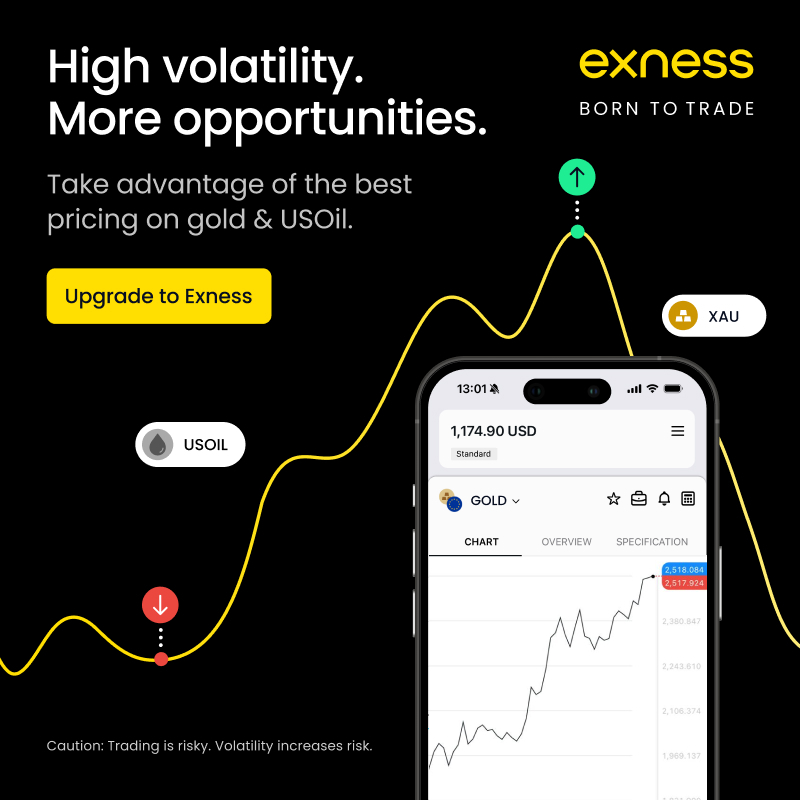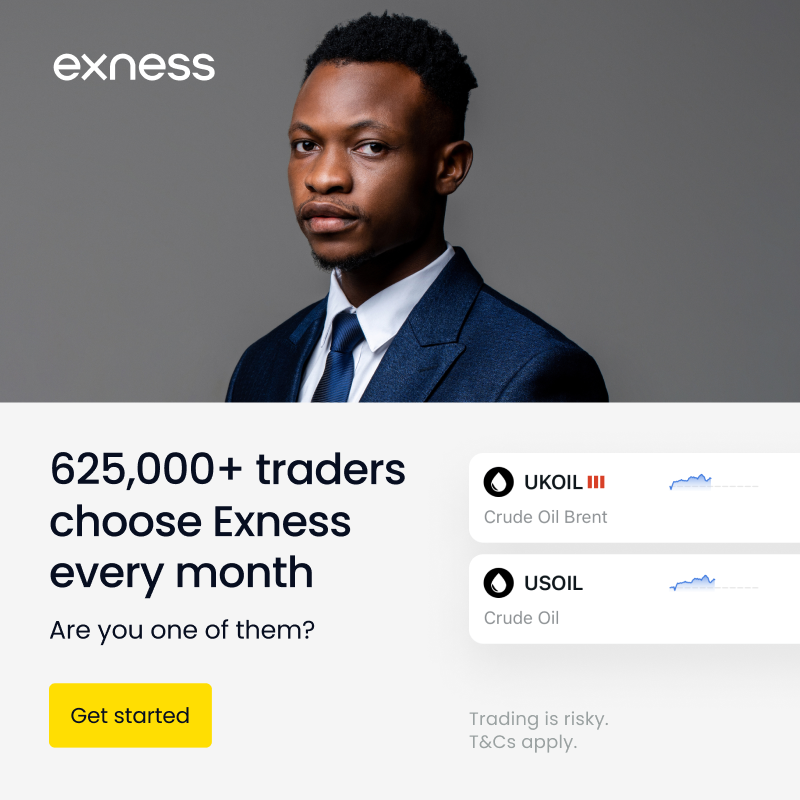
8 minute read
Is Exness a Good Broker in South Africa? A Straightforward Review 2025
from Exness
by Exness Blog
If you’re a South African trader wondering, “Is Exness a good broker?”—the short answer is yes, Exness is a solid choice for most traders in South Africa. It’s regulated, offers low-cost trading, and supports local needs like ZAR accounts. But, like any broker, it has its quirks. In this review, I’ll dive into everything you need to know about Exness in South Africa—its features, pros, cons, and whether it suits your trading style. Let’s get started!

✅ Trade with Exness now: Open An Account or Visit Brokers 👈
Why Exness Stands Out in South Africa
Exness, founded in 2008, has grown into one of the world’s largest forex and CFD brokers, with over 1 million active clients and a monthly trading volume exceeding $4.8 trillion as of February 2025.
For South African traders, Exness ticks a lot of boxes: it’s regulated by the Financial Sector Conduct Authority (FSCA), offers tight spreads, and supports local payment methods. But what makes it truly appealing? Let’s break it down.
1. Regulation and Safety: Can You Trust Exness?
Trust is non-negotiable when choosing a broker, especially in South Africa’s fast-growing forex market. Exness operates in South Africa through Exness ZA (Pty) Ltd, which holds an FSCA license (FSP number 51024, granted in 2020).
The FSCA ensures brokers follow strict rules, like segregating client funds and maintaining transparency. This means your money is kept separate from Exness’s operational funds, reducing the risk of loss if the broker faces financial trouble.
That said, some South African traders are onboarded through Exness’s Seychelles entity, regulated by the Financial Services Authority (FSA). While the FSA is legit, it doesn’t offer the same level of local oversight as the FSCA. Still, Exness bolsters trust with additional licenses from top-tier regulators like the UK’s Financial Conduct Authority (FCA) and Cyprus’s CySEC.
Plus, features like negative balance protection (you can’t lose more than your deposit) and regular audits by Deloitte make Exness a low-risk choice. For most traders, this regulatory framework is reassuring, but if local oversight is a dealbreaker, double-check which entity you’re signing up with.
2. Trading Costs: Is Exness Affordable?
One of Exness’s biggest draws is its low-cost trading. Spreads start as low as 0.0 pips on accounts like Raw Spread and Zero, which is a dream for scalpers and day traders. For the Standard account, spreads for major pairs like EUR/USD average around 1 pip—competitive compared to brokers like IG (0.6 pips) or XM.
Standard accounts are commission-free, while professional accounts (Raw Spread, Zero) charge a small commission (e.g., $7 per lot) for even tighter spreads.
For South Africans, the ability to open a ZAR-based account is a game-changer. No currency conversion fees mean you save on every deposit and withdrawal. Speaking of withdrawals, Exness is known for instant processing—98% of withdrawals are completed in under a minute.
You can use local payment methods like internet banking, bank cards, Skrill, or Neteller, often with zero fees from Exness (though some providers may charge). Compared to competitors, Exness’s cost structure is a win for budget-conscious traders.
3. Account Types: Something for Everyone
Exness offers five account types to suit different trading styles:
Standard Account: Perfect for beginners with a $10 minimum deposit and commission-free trading.
Standard Cent Account: Ideal for newbies testing strategies with tiny lot sizes (cent lots) and a $10 minimum deposit.
Raw Spread Account: For experienced traders who want ultra-low spreads (from 0.0 pips) with a $7/lot commission.
Zero Account: Offers 0.0-pip spreads on major instruments for a slightly higher commission.
Pro Account: Balances low spreads and moderate commissions for professional traders.
The low minimum deposit ($10) makes Exness accessible, especially compared to brokers like IG, where practical entry points are higher. South Africans can also trade over 100 forex pairs, plus CFDs on cryptocurrencies, commodities, indices, and stocks. However, the stock CFD selection (only 70 instruments) is limited compared to competitors like XM.
4. Platforms: User-Friendly and Customizable
Exness supports MetaTrader 4 (MT4), MetaTrader 5 (MT5), and its proprietary Exness Terminal, available on desktop, mobile, and web. MT4 and MT5 are industry standards, offering robust charting, technical indicators, and Expert Advisors for automated trading.
The Exness Terminal is a standout for its sleek design and drag-to-modify order features, making it beginner-friendly yet powerful. South African traders also get access to TradingView charts and Trading Central analysis via the mobile app, which is a nice touch for staying on top of market trends.
That said, advanced platforms like MT5 might feel overwhelming for beginners. If you’re new, start with the Exness Terminal or a demo account to ease in. The demo account mirrors real market conditions, letting you practice risk-free.
5. Local Support for South African Traders
Exness understands South Africa’s unique needs. Beyond ZAR accounts and local payment methods, the broker offers 24/7 customer support in English via live chat, email, and phone. However, some reviews note slow response times, especially for complex queries.
Exness also provides educational resources like webinars, tutorials, and market analysis from FXStreet and Trading Central, which are great for beginners looking to level up.
One downside? Exness doesn’t have a physical office in South Africa, which might bother traders who prefer face-to-face interaction. Still, the broker’s digital-first approach aligns with the needs of most modern traders.

✅ Trade with Exness now: Open An Account or Visit Brokers 👈
Pros of Trading with Exness in South Africa
FSCA Regulation: Local oversight ensures transparency and fund security.
Low Costs: Tight spreads (from 0.0 pips) and commission-free Standard accounts.
ZAR Accounts: No conversion fees for South African traders.
Fast Withdrawals: Instant processing for most methods.
Flexible Leverage: Up to 1:2000 (use cautiously!).
Wide Instrument Range: Over 100 forex pairs, plus crypto, commodities, and indices.
Cons to Consider
Seychelles Onboarding: Some traders are registered under the less-regulated Seychelles entity.
No Bonuses: Unlike XM or Hotforex, Exness rarely offers promotions.
Limited Stock CFDs: Only 70 stock CFDs compared to competitors.
Customer Support: Mixed reviews on response times.
High Leverage Risks: 1:2000 leverage can amplify losses if mismanaged.
Exness vs. Competitors: How Does It Stack Up?
To give you context, let’s compare Exness to two popular brokers in South Africa: IG and XM.
· Exness vs. IG:
Regulation: Both are FSCA-regulated, but IG has a stronger global presence.
Minimum Deposit: Exness ($10) is lower than IG’s practical entry point.
Spreads: Exness (0.3 pips for EUR/USD) beats IG (0.6 pips).
Leverage: Exness (1:2000) dwarfs IG (1:200).
Platforms: IG’s proprietary platform is simpler, but Exness’s MT4/MT5 are more customizable.
Verdict: Exness is better for cost-conscious traders; IG suits those who want a polished, simple platform.
· Exness vs. XM:
Regulation: Both are FSCA-regulated with global licenses.
Minimum Deposit: Exness ($10) edges out XM ($5-$100 depending on account).
Spreads: Exness’s spreads are tighter (0.3 vs. XM’s 0.6-1.0 pips).
Bonuses: XM offers deposit bonuses; Exness doesn’t.
Verdict: Exness wins on costs and flexibility, but XM’s bonuses may appeal to some.
Tips for South African Traders Using Exness
To make the most of Exness, keep these tips in mind:
Start with a Demo Account: Practice strategies without risking real money.
Use Low Leverage: Start with 1:50 or 1:100 to manage risks, as high leverage (1:2000) can wipe out accounts fast.
Trade ZAR Pairs: USD/ZAR and EUR/ZAR align with local market trends and save on conversion costs.
Stay Informed: Monitor South Africa’s economic news, as ZAR volatility is common.
Leverage Education: Use Exness’s webinars and tutorials to sharpen your skills.
Is Exness Right for You?
Exness is a great fit for South African traders who prioritize low costs, flexibility, and a wide range of instruments. Its FSCA regulation, ZAR accounts, and instant withdrawals make it a strong contender in the local market.
Beginners will appreciate the low entry point and demo account, while pros can leverage tight spreads and customizable platforms. However, the Seychelles onboarding for some traders, limited stock CFDs, and lack of bonuses might be drawbacks for certain users.
If you’re a cost-conscious trader who values speed and reliability, Exness is worth a shot. But if you need local oversight or prefer bonus-driven brokers, you might want to explore XM or Hotforex. Ultimately, your choice depends on your trading goals, risk tolerance, and experience level. Why not start with a demo account and see if Exness feels right?
Final Thoughts
Exness has earned its spot as a top broker in South Africa, thanks to its competitive trading conditions, robust regulation, and tailored features like ZAR accounts. While it’s not perfect—no broker is—its low spreads, fast withdrawals, and user-friendly platforms make it a reliable choice for 2025.
Whether you’re trading forex, crypto, or commodities, Exness offers the tools to succeed. Just remember to trade smart, manage risks, and verify your account’s regulatory entity for peace of mind.
✅ Trade with Exness now: Open An Account or Visit Brokers 👈
Read more:










